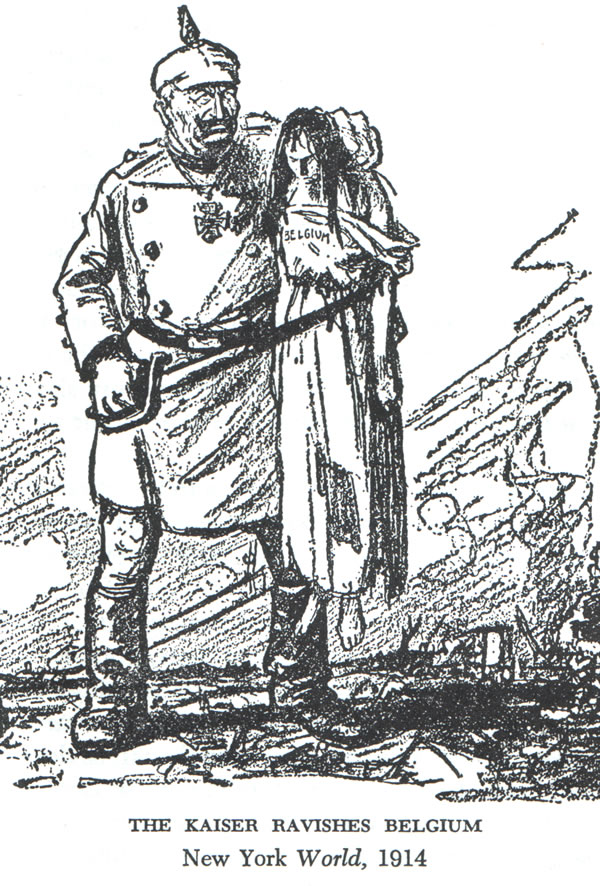The refusal of President Obama to work with the President of Syria, Bashar Assad, against a common enemy, ISIS, is typically rationalized by declaring that Assad is a dictator, and a brutal dictator who imprisons Syrians who oppose him. Perhaps he has executed some without trial, or at least without the kind of trial you can get in the U.S. if you are not just gunned down in the street, and if you can afford a good lawyer.
Is there a qualitative difference between leaders like Bashar Assad and American Presidents who have arrested and executed their opponents? If so, what are the factors that make the difference qualitative? Is there a meaningful difference between imprisoning or killing peaceful opposition, as opposed to armed opposition in a civil war?
Here I will examine these question in the context of World War I. That will give some historical distance. Yet it was the greed displayed by France and Great Britain during World War I that led to the Middle East being politically unstable since that era.
Woodrow Wilson was elected President of the United States in 1912. It is difficult today to imagine the politics of that era. Both the Democratic Party and the Republican Party had liberal and conservative wings; on the whole I think the Republican Party was still the more progressive of the two. William H. Taft was President and ran for re-election as a Republican. Taft had been Vice-President under Theodore Roosevelt, who ran on the Progressive Party ticket after he failed to get the Republican Party nomination. These were the results:
| 1912 | Party | Popular Votes | Electoral College Votes |
| Woodrow Wilson | Democratic |
6,293,454
|
435
|
| Theodore Roosevelt | Progressive |
4,119,538
|
88
|
| William H. Taft | Republican |
3,484,980
|
8
|
| Eugene V. Debs | Socialist |
900,672
|
0
|
| Eugene W. Chafin | Prohibition |
206,275
|
0
|
Woodrow Wilson is arguably the intellectual architect of modern segregation. So it should not be surprising that he won every state in the racist, conservative Old South.
Woodrow Wilson was not just a white supremacist, he was a true believer in the supremacy of Anglo-Saxon culture. When World War I broke out in Europe he favored backing the British Empire, which then oppressed about 1/3 of the world's people. But domestic politics, including large numbers of Irish-American and German-American voters in the Democratic Party, kept the President and the United States in a state of neutrality.
Socialism was meant to be an international movement for peace and justice, and before the war Socialist parties in Europe opposed their respective governments militarism. However, after the war started, each nation's Socialist Party tended to rationalize supporting their own nation's efforts.
President Wilson ran again in 1916, rallying voters to the slogan "He kept us out of war." Anyway, he was too busy invading Mexico and a variety of Latin American nations. But the voting went back to the normal Democrat vs. Republican split:
| 1916 | Party |
Popular Votes
|
Electoral College Votes
|
| Woodrow Wilson | Democratic |
9,129,606
|
227
|
| Charles E. Hughes | Republican |
8,538,221
|
254
|
| A. I. Benson | Socialist |
585,113
|
0
|
| J. F. Hanly | Prohibition |
220,506
|
0
|
Unlike in Germany, France, and Britain, the Socialist Party in the United States did not give up its peaceful and internationalist stand. It opposed the war, as did the IWW and other organizations and individuals. Wilson's reaction? He ordered massive arrests of those who opposed him.
One of those arrested was Eugene V. Debs, who had opposed him as a Presidential candidate in 1912. In 1918 Wilson was arrested. He was found guilty on September 12 and was thrown in a dungeon. The Supreme Court of the United States, in Debs v. United States (249 U.S. 211 (1919)) ruled neither Debs nor any other American's right of free speech included the right to be for peace during wartime.
Debs ran for President in 1920, from his jail cell, and received 919,799 votes.
So how different is that from Assad putting one of his critics in jail?
Wilson is not alone among Presidents and other powerful Americans in his crimes against humanity. George Washington executed soldiers for desertion even before he was elected President. Every U.S. rebellion has been brutally put down, most notably in the Civil War. Ronald Reagan ordered peaceful demonstrators to be shot dead even before he became President. The list is finite, but large.
I might sympathize with rebels in certain cases, but I don't expect anyone in power to hand over the keys to the government without a fight. Deciding to rebel, as the American slave masters did in 1776, is a hazardous course, not to be undertaken lightly.
Bashar Assad's crime, from Obama and the American Establishment point of view, is not that he has held on to power, or how he has held onto power. His crime is not becoming a pro-American puppet. His crime is doing what he thinks is best for Syria.
Some times there are happy endings. When Warren G. Harding was elected President in 1920 he tried hard to undo Wilson's worst deeds. He made peace with Germany, and he released Eugene V. Debs from prison. Harding was a Republican, and he made the mistake of letting his corrupt friends run the nation. But I'll take him for a better U.S. President any day over Woodrow Wilson.
And I'll take Eugene V. Debs over any elected President in U.S. history.

